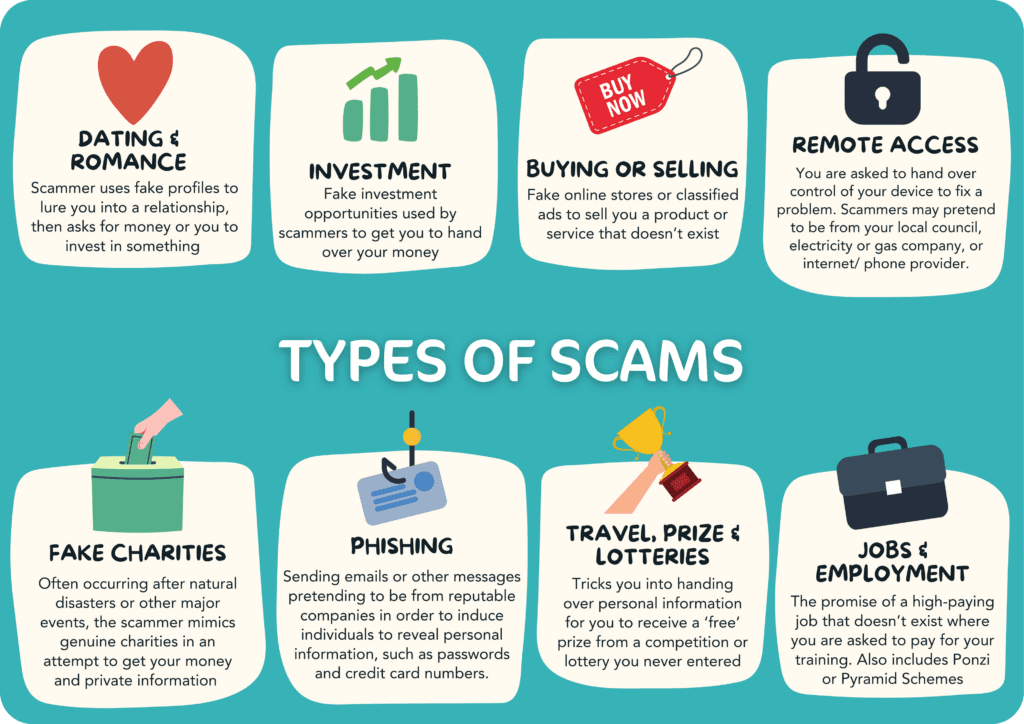As we all prepare for the start of the silly season, scammers are also getting ready. Christmas is one of the busiest periods for scams as people are often too distracted to pay attention to smaller things, making them vulnerable.
Today also marks the beginning of Scams Awareness Week, an annual campaign aimed at raising awareness of scams in Australia. We’ve prepared some resources to help you stay informed about scams and what to do if you are a victim of one.
What is a Scam
A scam is a way of tricking people into handing over money, personal details, and/or other sensitive data. You may encounter scams on a variety of different platforms, such as by text/SMS, phone calls, email, social media, websites and even in person. Scams are constantly changing and evolving with new technology, so it’s important to stay informed.
Types of scams
There are many different types of scams, here are a few of the most common ones you may come across.

Spotting a Scam
Being alert to scams and how they work is a great way to protect yourself while online. Scams are effective because they often look legitimate and act on a feeling of urgency. With every message you receive online always stop, think, and check, there may be some obvious red flags telling you it’s a scam. Common signs that what you’re dealing with could be a scam are:
- It seems too good to be true,
- Something seems off,
- There are spelling mistakes or bad grammar,
- Someone you’ve never met needs your help and/or money,
- Message contains links or attachments,
- There’s a sense of urgency,
- They ask you to set up new accounts.
Example of a scam – “Hi Mum/Dad”
A common scam that can happen on a range of different messaging platforms. The scammer will pose as a relative, typically as your child but could also claim to be a parent. The conversation will usually begin with them saying they have a ‘new’ number or that they have broken their phone so they’re using their friends. They will then ask for money to pay an urgent expense.
If you receive a message like this, DON’T send them any money or follow any links that are sent. There are a few ways to verify if these messages are legitimate if you have concerns.
- Call the person that they are claiming to be on their usual number
- Use an alternative messaging app to contact the person
- Check in with other family members to see if they have received a similar notification of a change of number

You can find a few red flags in these messages that we have mentioned earlier. The scammer is acting with a sense of urgency and the message seems ‘off’. is there anything in the message that may be out of character for the person they are claiming to be? For example, are they typically careful with their spelling and grammar and the message is riddled with mistakes?
Don’t transfer any funds being requested in these messages and call your relative on their ‘old’ number to confirm. If you do transfer funds, the likelihood of recovering these funds would be minimal, if any.
What to do if You’ve Been Scammed
If you believe you’ve been scammed here are the next steps, you can take to limit the damage.
- Don’t send any more money and block all contact with the scammer
- Get in contact with your bank immediately to report the scam and stop any further transactions
- Warn family and friends about the scam
- Report the scam to ScamWatch
- You can also make an official report to the police online
Other Resources
IDCARE is Australia and New Zealand’s national identity and cyber support service. They can help you make a free plan to limit the damage.
Talk to a financial counsellor
Support for you
It’s important to remember that scams can happen to anyone. They succeed because of how authentic they can look, making it easy for them to catch you off guard. Scams are not only financially damaging, but they can also cause emotional distress. Those who have been scammed may have feelings of embarrassment,
If you need to talk to someone, reach out to friends and family. Alternatively, free resources such as Beyond Blue and Lifeline are available 24 hours a day, 7 days a week.
Beyond Blue
1300 22 4636
Lifeline
13 11 14
Scams Awareness Week runs from the 27th November to the 1st December, for more information, visit Scamwatch Scams Awareness Week




